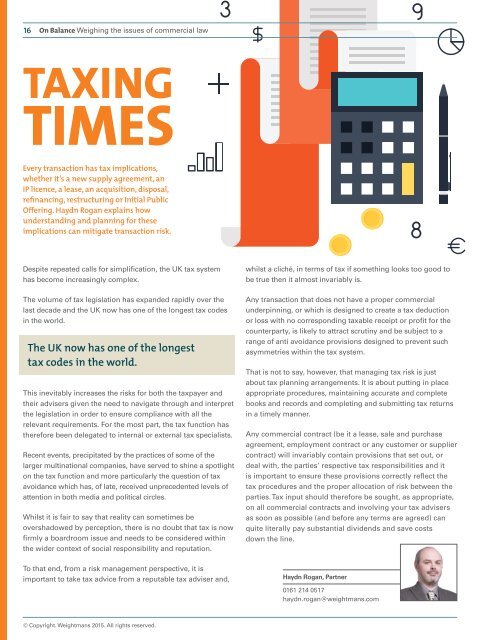On Balance Autumn/Winter 2015
You also want an ePaper? Increase the reach of your titles
YUMPU automatically turns print PDFs into web optimized ePapers that Google loves.
16 <strong>On</strong> <strong>Balance</strong> Weighing the issues of commercial law<br />
TAXING<br />
TIMES<br />
Every transaction has tax implications,<br />
whether it’s a new supply agreement, an<br />
IP licence, a lease, an acquisition, disposal,<br />
refinancing, restructuring or Initial Public<br />
Offering. Haydn Rogan explains how<br />
understanding and planning for these<br />
implications can mitigate transaction risk.<br />
Despite repeated calls for simplification, the UK tax system<br />
has become increasingly complex.<br />
The volume of tax legislation has expanded rapidly over the<br />
last decade and the UK now has one of the longest tax codes<br />
in the world.<br />
The UK now has one of the longest<br />
tax codes in the world.<br />
This inevitably increases the risks for both the taxpayer and<br />
their advisers given the need to navigate through and interpret<br />
the legislation in order to ensure compliance with all the<br />
relevant requirements. For the most part, the tax function has<br />
therefore been delegated to internal or external tax specialists.<br />
Recent events, precipitated by the practices of some of the<br />
larger multinational companies, have served to shine a spotlight<br />
on the tax function and more particularly the question of tax<br />
avoidance which has, of late, received unprecedented levels of<br />
attention in both media and political circles.<br />
Whilst it is fair to say that reality can sometimes be<br />
overshadowed by perception, there is no doubt that tax is now<br />
firmly a boardroom issue and needs to be considered within<br />
the wider context of social responsibility and reputation.<br />
To that end, from a risk management perspective, it is<br />
important to take tax advice from a reputable tax adviser and,<br />
whilst a cliché, in terms of tax if something looks too good to<br />
be true then it almost invariably is.<br />
Any transaction that does not have a proper commercial<br />
underpinning, or which is designed to create a tax deduction<br />
or loss with no corresponding taxable receipt or profit for the<br />
counterparty, is likely to attract scrutiny and be subject to a<br />
range of anti avoidance provisions designed to prevent such<br />
asymmetries within the tax system.<br />
That is not to say, however, that managing tax risk is just<br />
about tax planning arrangements. It is about putting in place<br />
appropriate procedures, maintaining accurate and complete<br />
books and records and completing and submitting tax returns<br />
in a timely manner.<br />
Any commercial contract (be it a lease, sale and purchase<br />
agreement, employment contract or any customer or supplier<br />
contract) will invariably contain provisions that set out, or<br />
deal with, the parties’ respective tax responsibilities and it<br />
is important to ensure these provisions correctly reflect the<br />
tax procedures and the proper allocation of risk between the<br />
parties. Tax input should therefore be sought, as appropriate,<br />
on all commercial contracts and involving your tax advisers<br />
as soon as possible (and before any terms are agreed) can<br />
quite literally pay substantial dividends and save costs<br />
down the line.<br />
Haydn Rogan, Partner<br />
0161 214 0517<br />
haydn.rogan@weightmans.com<br />
© Copyright. Weightmans <strong>2015</strong>. All rights reserved.




